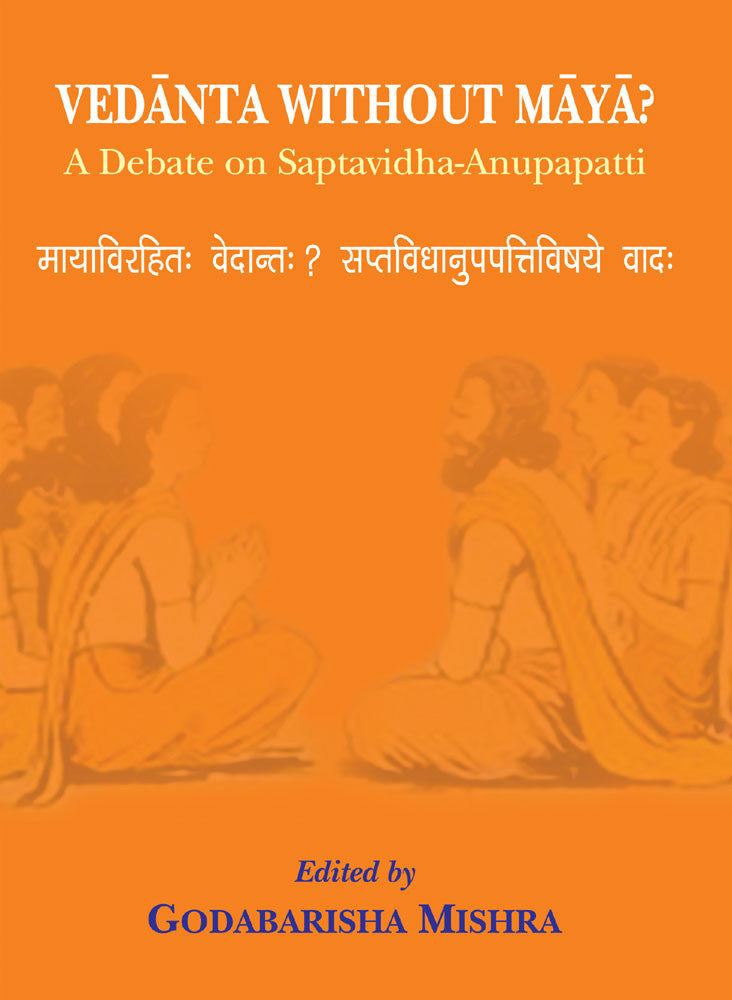Vedanta Without Maya?: A Debate on Saptavidha-Anupapatti
![]() 100% Genuine New Books
100% Genuine New Books
![]() Fast Shipping with Tracking Number
Fast Shipping with Tracking Number
Secure Payments via UPI, Cards & Wallets
![]() Trusted Support & Easy Returns
Trusted Support & Easy Returns
Vedanta Without Maya?: A Debate on Saptavidha-Anupapatti - Hardcover is backordered and will ship as soon as it is back in stock.
ISBN : 9788120839793, 812083979
Year of Publication : 2015
Edition : 1st
No. of Pages : 378
Language : Sanskrit & English
Condition : New
Publisher: Motilal Banarsidass Publishing House
Free shipping on orders over Rs. 249
Free shipping on orders over Rs. 249
We offer free shipping on orders above Rs. 249 in India. For orders below this threshold, a nominal shipping fee may apply, which will be clearly indicated during the checkout process.
How long will it take to receive my order?
How long will it take to receive my order?
The delivery time varies depending on your location. Generally, orders are processed and shipped within 1-3 business days. Once shipped, you can track and expect your order to arrive within 3-7 business days (the duration may vary depending on your location). For more information, please refer to our shipping policy.
Chat with a Real Person
Chat with a Real Person
WhatsApp chat is dedicated to assisting with after-sales queries regarding delivery, returns, and payments. Click below to initiate chat with us on WhatsApp:
[Bookstaa WhatsApp Chat].
For all other inquiries, please visit our customer support page or email us at support@bookstaa.com.
Couldn't load pickup availability
Description
Description
Saptavidha-anupapatti represents a live-debate in the traditions of Vedanta initiated by Ramanujacarya. The central issue of this debate is to examine whether maya-avidya, postulated by Advaita-vedant, is philosophically sustainable, logically viable, and experientially reliable. While Sankara builds up the superstructure of Advaita on the basis of this concept, Ramanuja vociferously reacts to its philosophical ingenuity. This dispute between the Advaita and Visistadvaita schools with seven objections, which forms the manor theme of this book, has been going on for more than a millennium and is alive even today among Vedanta scholars.
The volume contains, besides historical as well as philosophical explorations of the concept of maya-avidya, the arguments and counter arguments, formulation and counter-formulation to accommodate and reject the corresponding philosophical predilections of both the above schools by some of the preeminent philosophical minds of Indian philosophy of our times.
Review(s)
The polemics among various philosophical schools is both unending and also a wonderful way for adherents to become clearer on their particular doctrine. Each school makes certain presuppositions upon which the school's philosophy is based. Advaita Vedanta philosophy is based upon its key concept of evidya/ maya. Given its definition of avidya/ maya everything else unfolds, consistently and coherently. Visistadvaita Vedanta, employing its key concept of aprtak-siddhi, challenges Advaita's doctrine. The same holds true for Dvaita Vedanta and its key concept of bheda. Once any philosophical system defines its basic presupposition, its polemics will unfold naturally, coherently, and consistently. The seven great untenables (saptavidha-anupapatti) arose and developed over the centuries in an attempt by Visistadvaita Vedanta and then other systems in an effort to undercut Advaita's philosophy. This book is a varied collection of articles written by modern Indian philosophers describing, elucidating, and analyzing various philosophical system's dialectics to either defend or criticize Advaita Vedanta's doctrine of avidya/ maya. - John Grimes
This book, in the language of Copleston, shows that philosophy, which is the work of human spirit grows and develops; fresh vistas may be opened up by a new lines of approach or application to new problems, newly discovered facts, fresh situations, etc. ... . Further, this
volume proves that there is continuity and connection, action and reaction, thesis and antithesis and no philosophy can really be understood fully unless it is seen in its historical setting and in the light of its connection with other systems. - N. VEEZHINATHAN
About the Author(s)
Godabarisha Mishra is the Chairman of the School of Philosophy and Religious Thought at the University of Madras. Formerly worked as an Editor at the Kuppuswami Sastri Research Institute, Chennai, he also served as the Member Secretary of Indian Council of Philosophical Research, New Delhi.
About the Publisher

Motilal Banarsidass Publishing House (MLBD)
Motilal Banarsidass Publishing House, popularly known as MLBD, is one of the oldest and most prestigious publishing houses in India, established in 1903.
With over a century of legacy, MLBD has been at the forefront of publishing scholarly works in the fields of Indology, Sanskrit, philosophy, religion, spirituality, yoga, Buddhism, and Jainism.
Renowned for its authenticity and academic rigour, MLBD's books are trusted by researchers, scholars, and readers across the globe.
With more than 5,000 titles in circulation, MLBD continues to uphold its commitment to preserving and promoting India’s rich cultural and philosophical heritage.
Bookstaa is an authorized distributor of MLBD books, ensuring 100% genuine and original publications for our readers.

